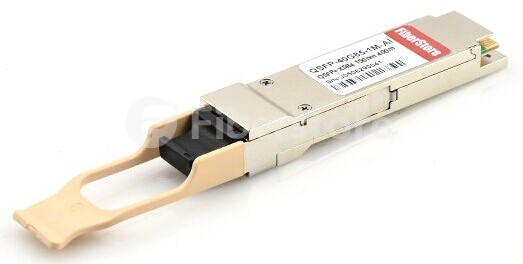In order to find a cost effective way to increase date rate, multiple communications companies announced the release of a quad small form-factor pluggable (QSFP) optical module specification in its final form in December 4, 2006. The QSFP specification defines a highly integrated four-channel optical transceiver to provide increased port density and total system cost savings when replacing four standard SFP transceiver modules. Since then, the 40GBASE QSFP module has become a dominant 40G optical transceiver and offers customers a wide variety of high-density 40 Gigabit Ethernet connectivity options for data center, high-performance computing networks, enterprise core and distribution layers, and service provider transport applications.
What Is QSFP Transceiver
QSFP transceiver module is a hot-swappable, parallel fiber-optical module with four independent optical transmit and receive channels. These channels can terminate in another 40-Gigabit QSFP transceiver, or the channels can be broken out to four separate 10-Gigabit SFP+ transceivers. For instance, QSFP-40G-SR provides four channels of data in one pluggable interface and each channel is capable of transferring data at 10 Gbps and supports a total of 40 Gbps. QSFP transceiver is an industry format jointly developed and supported by many network component vendors, allowing data rates from 4x10 Gbps. The QSFP product family includes cages in single and ganged configurations with various heat sink and lightpipe options. It uses 38 position connector and Electro Magnetic Interference (EMI) plugs are offered for empty ports to interface networking hardware to a fiber optic cable.
Advantages of QSFP Transceiver
The QSFP transceiver is designed with form factor, optical/electrical connection and digital diagnostic interface according to the QSFP Multi-Source Agreement (MSA). It has been designed to meet the harshest external operating conditions including temperature, humidity and EMI interference. The module offers very high functionality and feature integration, accessible via a two-wire serial interface. The quad small-form-factor pluggable (QSFP) is a full-duplex optical module with four independent transmit and receive channels designed to replace four single-channel SFPs in a package only about 30% larger than the standard SFP. The port density is three times higher than traditional SFP designs. As a result, the QSFP transceiver offers customers a wide variety of high-density and low-power 40 Gigabit Ethernet connectivity options for data center, high-performance computing networks, enterprise core and distribution layers, and service provider applications.
Applications of QSFP Transceiver
The QSFP specification accommodates Ethernet, Fibre Channel, InfiniBand and SONET/SDH standards with different data rate options. The QSFP transceiver modules can be connected to both copper and optical cables. In the process of transmitting data, the QSFP transceiver converts parallel electrical input signals into parallel optical signals by a driven Vertical Cavity Surface Emitting Laser (VCSEL) array. All data signals are differential and the data rate can be up to 10 Gbps per channel. As the QSFP transceivers are used to interface networking hardware to a fiber optic cable, the choice of them depends on many factors, like the transport media, the connector type, transmission distance, wavelength, etc. For example, Fiberstore provides various kinds of QSFP transceivers like Cisco QSFP-40G-ER4 compatible 40GBASE-ER4 transceiver which supports link lengths of 40 km on single-mode fiber cable at a wavelength of 1310nm.
QSFP transceivers supplied by Fiberstore offer customers a wide variety of high-density and low-power 40 Gigabit Ethernet connectivity options for data center, high-performance computing networks, enterprise core and distribution layers, as well as service provider applications.

No comments:
Post a Comment